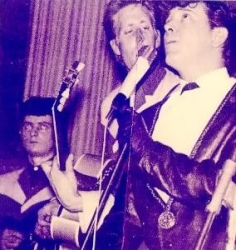Ritchie blackmore
 “Thank you … Of course, my father – for the fact that he bought me a guitar, with which it all started …”
“Thank you … Of course, my father – for the fact that he bought me a guitar, with which it all started …”
Ritchie Blackmore’s thanks to
last disc Rainbow
“Stranger In Us All” (1995)
Richard Hugh Blackmore was born on April 14, 1945 in the English town of Weston-Super-Mare. The first instrument – an ordinary acoustic guitar – was presented to Ritchie at the age of ten by his father, and it was his father who insisted that Ritchie not only learned to strum on six strings, but also take classical guitar lessons. At this time, the Blackmore family lived in the town of Heston, where in the house of their grandmother, Ritchie first heard the powerful music of JS Bach, which had sunk into the soul of the future guitar virtuoso for the rest of her life.
Ritchie Blackmore (Ritchie Blackmore)
The parents provided their scion with a “high start”: already at the age of 13, Ritchie began intensive studies of the instrument under the strict guidance of the best at the time British guitarist Jim Sullivan. But by this time, Ritchie already had experience in certain compositions that performed a skiffle superpopular on the British Isles at a purely amateur level – the first Blackmore band in which he began performing as early as 1956 bore the humorous name Dogbox (“Kennel”). It was followed by similar formulations of 21’s Coffee Bar Junior Skiffle Group, The Dominators and The Condors.
At the very beginning of 1962, Ritchie was unusually lucky: not anyone, but the gloomy hero of overseas rock’n’roll Gene Vincent invited the young guitarist to accompany his line-up (the old rock-and-rolls still prefer to recruit on the territory of future tours ), with which began the real career of Ritchie Blackmore. After the European tour and an instant stop in the Mike Dee And The Jaywalkers group, Ritchie found himself in May of 1962 as part of the group of one of the most bizarre British pop figures of the 60s David Satch Screaming Lord Sutch & His Savages. However, Ritchie soon became convinced that his employer was much more concerned about the problem of finding his name in the headlines of British tabloids – David Satch owned his own pirate radio station, tried to run for House of Commons with some kind of “electoral platform of 18-year-olds” and long before Alice Cooper arranged concerts with stage coffin in the form of coffins and guillotines.
The musical side of the first “king of horrors” rock scene instantly ceased to satisfy Blackmore, and after a few months he was in the ranks of the fundamentally instrumental composition “The Outlaws”, who also worked as his own studio group in the then-famous producer Joe Mick. As part of The Outlaws, Ritchie managed to record the acclaimed singles “Keep A-Knockin ‘” and “Snake With Me”, as well as work with such popular at that time British singers as Mike Berry and Heinz, and even for a short time he was in the group the last is Hainz ‘Wild Boys.
In the same 1964, Ritchie recorded his first solo single with the compositions “Little Brown Jug” and “Getaway”, and soon he joined the band Neil Christian The Crusaders. The next three years were for the guitarist a real carousel: in addition to The Crusaders, from which Ritchie left, he returned, he had plenty to play with The Lancasters (where for the first time he performed Edward Grieg’s treatment in the Cave of the Mountain King) The Savages, this time working as an accompanying member of the European tour of Jerry Lee Lewis, in the dramatized rock band Roman Empire and in the semi-mythical lineup Mandrake Root, which collapsed in October.
Deep Purple began with the former drummer of The Searchers, Chris Curtis, in 1966, but this story requires a separate discussion.




